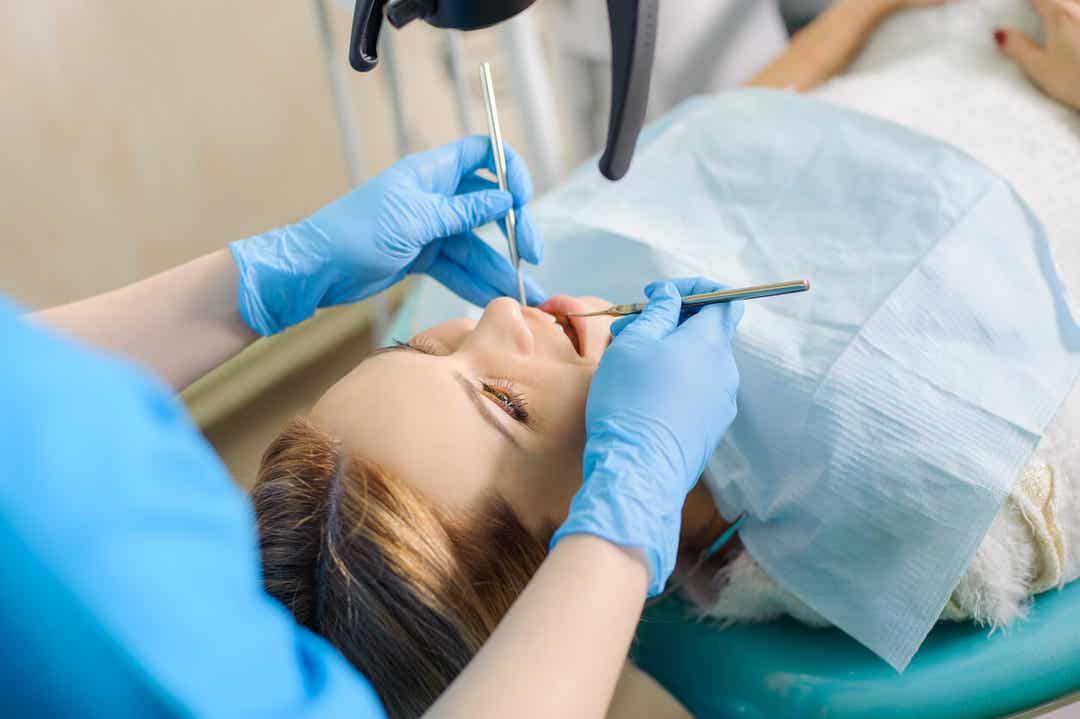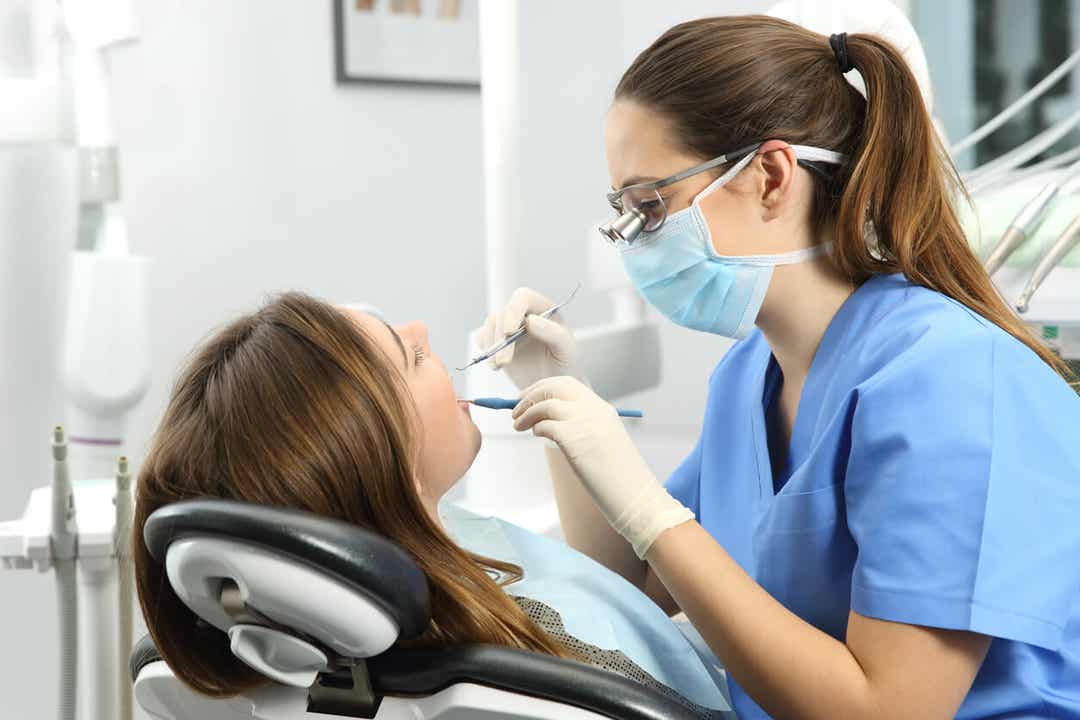Can I Have a Root Canal During Pregnancy?

When a woman’s expecting a baby, many questions arise regarding the safety of using certain products. This also includes eating certain foods or undergoing medical and dental procedures at this stage. The question of whether it’s possible to have a root canal during pregnancy is quite common.
This particular procedure involves the use of anesthesia, x-rays, and medication. How these affect the developing fetus is one of the great fears of expectant mothers. And sometimes, skipping the dentist seems like the best solution.
The truth is that letting a condition in the mouth progress and go untreated isn’t only bothersome and painful. It can also be dangerous. In the following paragraph, we’ll tell you what root canals consist of and what the purpose is. We’ll also discuss what you should keep in mind if you’re pregnant.
When is a root canal necessary?
Endodontics, also known as a root canal, is a dental treatment that involves cleaning and removing the damaged pulp tissue inside a tooth. The dental professional fills the space with a biocompatible material and seals it.

When the pulp of a tooth is affected, this treatment makes it possible to keep the diseased or dead tooth in the mouth and prevent its extraction. The most common cause of internal damage to a tooth element is deep cavities. Failure to treat the problem in time allows it to grow deeper. Therefore, it affects the pulp tissue, which is the soft part with nerve endings and blood vessels.
Another reason why a tooth may need a root canal is if it’s suffered a fracture, trauma, or severe blow. Therefore, there are symptoms that point to the need for this treatment, which is as follows:
- Pain in the tooth. It can be constant, intermittent, pulsating, and with different intensities, depending on the case.
- Sensitivity to cold and heat.
- Change in the color of the dental crown.
- Chewing discomfort.
- The appearance of a dental phlegmon or fistula.
- Swelling in the area.
As soon as any of these symptoms appear, it’s best to consult a dentist to solve the problem. Acting early prevents further discomfort, along with more serious complications.
How are root canals performed?
This dental treatment can take place in one or two sessions. Although it depends on the clinical case and the patient’s needs. In general, these are the steps:
- Anesthesia: so that the patient doesn’t feel pain, a professional applies a local anesthetic to the area.
- Access to the pulp chamber: the professional isolates the tooth with a special rubber band. Then, they use a tool to remove the diseased tissue and make a deep hole to reach the pulp.
- Cleaning: the dentist removes the pulp and cleans all the space it occupied. They use manual and rotary instruments to scrape the inner walls of the tooth. In addition, they inject disinfectant liquids into the inside of the piece to drag and remove debris from the organic tissue.
- Filling of the canal: when the area’s clean, the dentist fills the space with a biocompatible material. Most commonly, they use hot gutta-percha. It’s inserted until it reaches the end of the canals and is completed to occupy the entire area of the pulp chamber.
- Control x-ray: at this point, a professional takes a dental x-ray to ensure that the material reaches the root tip, but doesn’t exceed it.
- Reconstruction of the tooth: finally, the dentist fills the tooth with provisional or definitive material. This restores the shape of the tooth so that it can once again fulfill its function in the mouth.
Is it safe to have a root canal during pregnancy?
Not only is it possible and safe to perform a root canal during pregnancy, but it’s also convenient to avoid complications. Failure to treat a problematic tooth can lead to an infection. This poses a risk to the mother and baby.
In addition, both inflammation and infection of a tooth cause pain. This causes stress on the baby and contractions during pregnancy. This is another reason why treatment’s necessary and beneficial.
During periodic dental visits, the professional will evaluate the state of health of the woman’s mouth and the need for any treatment. If a root canal’s necessary and isn’t urgent, it’ll be scheduled to be performed at the most opportune moment.
If the woman presents symptoms such as pain, swelling of the face, or fistulas, she should immediately go to the dentist for a root canal. As already mentioned, these symptoms lead to other more serious complications.
It’s always a good idea to remind your dentist of your pregnancy status and how far along you are. Although it’s safe to perform these treatments, non-urgent treatments should be scheduled in advance. Preferably, they should be performed during the second trimester.
At this stage, the baby’s most important organs have already developed. Equally, the uncomfortable symptoms of the first trimester, such as vomiting and nausea, usually disappear. At the same time, having a root canal before the last trimester is also preferable. This is because the size of the belly and sitting for a long time in the same position can be tiring and uncomfortable.
Some common doubts about having a root canal during pregnancy
When a dentist tells a future mother to have a root canal during pregnancy, it’s common for fears and doubts to arise. If the professional knows about the pregnancy and is suggesting this alternative, it’s because they recognize that it’s a safe option.
Trusting the dentist is vital to keeping the mouth healthy during this stage. However, here, we’ll clarify some of the most common fears of pregnant women who need a root canal:

- Local anesthesia: dental anesthesia will most likely be necessary for the procedure. The doses used are minimal and pose no risk to either the mother or the fetus. In addition, it’s used to perform the procedure without discomfort. As we’ve already mentioned, pain can cause complications in pregnancy.
- X-rays: dental x-rays are necessary for this therapy. They allow the dentist to make an accurate diagnosis, measure the length of the canals being worked on, and verify the extent of the treatment. The doses of radiation used are minimal and don’t pose a risk to the fetus. In any case, the professional who performs a root canal during pregnancy protects the expectant mother with led aprons covering the abdomen and neck to minimize exposure.
- Medication: in some cases, the prescription of antibiotics and painkillers is necessary to complete the treatment. It’s important to remind the dentist of the pregnancy status, as well as if any other medications are being used. The professionals will prescribe drugs that can be taken safely. Pregnant women should never self-medicate.
The importance of dental checkups during pregnancy
A root canal’s a safe procedure that can be performed when the mother’s expecting a baby. However, it’s still an uncomfortable time that produces concern and even fear.
That’s why it’s so important to have frequent and regular dental checkups. Root canal treatment can often be avoided if the disease is treated early.
Visiting the dentist when planning a pregnancy is ideal. All necessary procedures can be performed safely and the pregnancy can begin with a healthy mouth.
Pregnant women should visit the dentist once per trimester. The professional will examine the mouth, help to take care of it, recommend necessary treatments, and determine when it’s convenient to perform them.
Dentists are an ally that pregnant women should trust. Oral health care’s essential to peace of mind during pregnancy.
When a woman’s expecting a baby, many questions arise regarding the safety of using certain products. This also includes eating certain foods or undergoing medical and dental procedures at this stage. The question of whether it’s possible to have a root canal during pregnancy is quite common.
This particular procedure involves the use of anesthesia, x-rays, and medication. How these affect the developing fetus is one of the great fears of expectant mothers. And sometimes, skipping the dentist seems like the best solution.
The truth is that letting a condition in the mouth progress and go untreated isn’t only bothersome and painful. It can also be dangerous. In the following paragraph, we’ll tell you what root canals consist of and what the purpose is. We’ll also discuss what you should keep in mind if you’re pregnant.
When is a root canal necessary?
Endodontics, also known as a root canal, is a dental treatment that involves cleaning and removing the damaged pulp tissue inside a tooth. The dental professional fills the space with a biocompatible material and seals it.

When the pulp of a tooth is affected, this treatment makes it possible to keep the diseased or dead tooth in the mouth and prevent its extraction. The most common cause of internal damage to a tooth element is deep cavities. Failure to treat the problem in time allows it to grow deeper. Therefore, it affects the pulp tissue, which is the soft part with nerve endings and blood vessels.
Another reason why a tooth may need a root canal is if it’s suffered a fracture, trauma, or severe blow. Therefore, there are symptoms that point to the need for this treatment, which is as follows:
- Pain in the tooth. It can be constant, intermittent, pulsating, and with different intensities, depending on the case.
- Sensitivity to cold and heat.
- Change in the color of the dental crown.
- Chewing discomfort.
- The appearance of a dental phlegmon or fistula.
- Swelling in the area.
As soon as any of these symptoms appear, it’s best to consult a dentist to solve the problem. Acting early prevents further discomfort, along with more serious complications.
How are root canals performed?
This dental treatment can take place in one or two sessions. Although it depends on the clinical case and the patient’s needs. In general, these are the steps:
- Anesthesia: so that the patient doesn’t feel pain, a professional applies a local anesthetic to the area.
- Access to the pulp chamber: the professional isolates the tooth with a special rubber band. Then, they use a tool to remove the diseased tissue and make a deep hole to reach the pulp.
- Cleaning: the dentist removes the pulp and cleans all the space it occupied. They use manual and rotary instruments to scrape the inner walls of the tooth. In addition, they inject disinfectant liquids into the inside of the piece to drag and remove debris from the organic tissue.
- Filling of the canal: when the area’s clean, the dentist fills the space with a biocompatible material. Most commonly, they use hot gutta-percha. It’s inserted until it reaches the end of the canals and is completed to occupy the entire area of the pulp chamber.
- Control x-ray: at this point, a professional takes a dental x-ray to ensure that the material reaches the root tip, but doesn’t exceed it.
- Reconstruction of the tooth: finally, the dentist fills the tooth with provisional or definitive material. This restores the shape of the tooth so that it can once again fulfill its function in the mouth.
Is it safe to have a root canal during pregnancy?
Not only is it possible and safe to perform a root canal during pregnancy, but it’s also convenient to avoid complications. Failure to treat a problematic tooth can lead to an infection. This poses a risk to the mother and baby.
In addition, both inflammation and infection of a tooth cause pain. This causes stress on the baby and contractions during pregnancy. This is another reason why treatment’s necessary and beneficial.
During periodic dental visits, the professional will evaluate the state of health of the woman’s mouth and the need for any treatment. If a root canal’s necessary and isn’t urgent, it’ll be scheduled to be performed at the most opportune moment.
If the woman presents symptoms such as pain, swelling of the face, or fistulas, she should immediately go to the dentist for a root canal. As already mentioned, these symptoms lead to other more serious complications.
It’s always a good idea to remind your dentist of your pregnancy status and how far along you are. Although it’s safe to perform these treatments, non-urgent treatments should be scheduled in advance. Preferably, they should be performed during the second trimester.
At this stage, the baby’s most important organs have already developed. Equally, the uncomfortable symptoms of the first trimester, such as vomiting and nausea, usually disappear. At the same time, having a root canal before the last trimester is also preferable. This is because the size of the belly and sitting for a long time in the same position can be tiring and uncomfortable.
Some common doubts about having a root canal during pregnancy
When a dentist tells a future mother to have a root canal during pregnancy, it’s common for fears and doubts to arise. If the professional knows about the pregnancy and is suggesting this alternative, it’s because they recognize that it’s a safe option.
Trusting the dentist is vital to keeping the mouth healthy during this stage. However, here, we’ll clarify some of the most common fears of pregnant women who need a root canal:

- Local anesthesia: dental anesthesia will most likely be necessary for the procedure. The doses used are minimal and pose no risk to either the mother or the fetus. In addition, it’s used to perform the procedure without discomfort. As we’ve already mentioned, pain can cause complications in pregnancy.
- X-rays: dental x-rays are necessary for this therapy. They allow the dentist to make an accurate diagnosis, measure the length of the canals being worked on, and verify the extent of the treatment. The doses of radiation used are minimal and don’t pose a risk to the fetus. In any case, the professional who performs a root canal during pregnancy protects the expectant mother with led aprons covering the abdomen and neck to minimize exposure.
- Medication: in some cases, the prescription of antibiotics and painkillers is necessary to complete the treatment. It’s important to remind the dentist of the pregnancy status, as well as if any other medications are being used. The professionals will prescribe drugs that can be taken safely. Pregnant women should never self-medicate.
The importance of dental checkups during pregnancy
A root canal’s a safe procedure that can be performed when the mother’s expecting a baby. However, it’s still an uncomfortable time that produces concern and even fear.
That’s why it’s so important to have frequent and regular dental checkups. Root canal treatment can often be avoided if the disease is treated early.
Visiting the dentist when planning a pregnancy is ideal. All necessary procedures can be performed safely and the pregnancy can begin with a healthy mouth.
Pregnant women should visit the dentist once per trimester. The professional will examine the mouth, help to take care of it, recommend necessary treatments, and determine when it’s convenient to perform them.
Dentists are an ally that pregnant women should trust. Oral health care’s essential to peace of mind during pregnancy.
All cited sources were thoroughly reviewed by our team to ensure their quality, reliability, currency, and validity. The bibliography of this article was considered reliable and of academic or scientific accuracy.
- Aboalshamat, Khalid, et al. “Endodontic Treatment in Pregnancy: Knowledge, Attitudes, and Practices of Dentists and Interns in Jeddah, Saudi Arabia.” The Open Dentistry Journal 14.1 (2020). https://benthamopen.com/ABSTRACT/TODENTJ-14-211
- Rodríguez, Javier Alvarez. “Endodoncia Clínica.” https://www.researchgate.net/profile/Javier-Alvarez-Rodriguez/publication/315262820_ENDODONCIA_CLINICA_De_la_Teoria_Academica_a_la_Practica_Asistencial/links/58cc3b64a6fdcc5cccb98994/ENDODONCIA-CLINICA-De-la-Teoria-Academica-a-la-Practica-Asistencial.pdf
- Calderón, Yeniffer Anyosa, et al. “Mitos y evidencias en odontología sobre la gestación.” Revista Científica Odontológica 7.1 (2019): 113-120. https://revistas.cientifica.edu.pe/index.php/odontologica/article/view/494
- Alfaro Alfaro, Ascensión, et al. “Embarazo y salud oral.” Revista Clínica de Medicina de Familia 11.3 (2018): 144-153. https://scielo.isciii.es/scielo.php?script=sci_arttext&pid=S1699-695X2018000300144
- Idrovo, Eugenio Patricio. “ANTIBIOTICOS INDICADOS EN ODONTOLOGIA.” Odontología Activa Revista Científica 4.Esp (2019): 65-70. https://oactiva.ucacue.edu.ec/index.php/oactiva/article/view/409
- Suárez, Dubraska. “Antibioticoterapia en Odontología durante el embarazo.” Una Educación Universitaria de Calidad. Tomo II: 6. http://bdigital2.ula.ve:8080/xmlui/bitstream/handle/654321/5154/UnaEducacionUniversitariadeCalidad_Parte1.pdf?sequence=10#page=21
- Butler, Teresa Adela, et al. “Recaudos a considerar en las embarazadas para la prescripción antibiótica.” II Jornadas de Actualización en Prácticas Odontológicas Integradas (SEPOI-PPS)(La Plata, 2017). 2017. http://sedici.unlp.edu.ar/handle/10915/65303
- Pazmiño Rojas, Karina del Cisne. Conocimiento sobre el manejo farmacológico de mujeres embarazadas en docentes de la Facultad Piloto de Odontología. BS thesis. Universidad de Guayaquil. Facultad Piloto de Odontología., 2019. http://repositorio.ug.edu.ec/handle/redug/40396
This text is provided for informational purposes only and does not replace consultation with a professional. If in doubt, consult your specialist.








